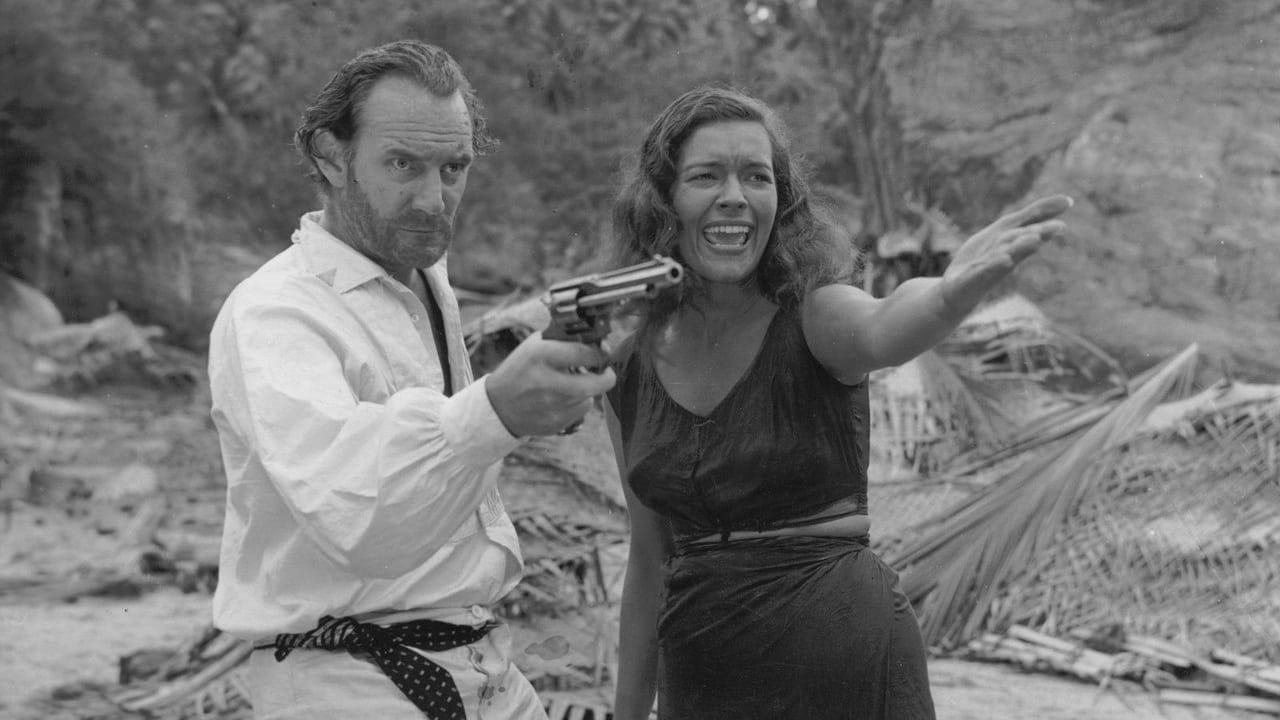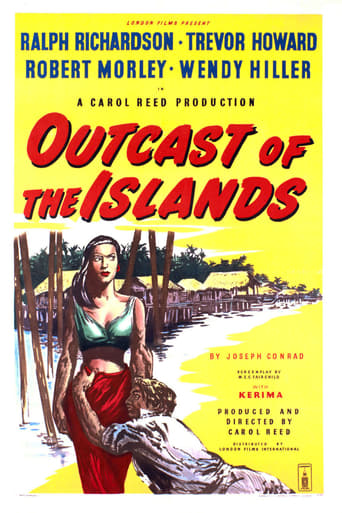



It’s fine. It's literally the definition of a fine movie. You’ve seen it before, you know every beat and outcome before the characters even do. Only question is how much escapism you’re looking for.
View MoreAmazing worth wacthing. So good. Biased but well made with many good points.
View MoreThe tone of this movie is interesting -- the stakes are both dramatic and high, but it's balanced with a lot of fun, tongue and cheek dialogue.
View MoreStory: It's very simple but honestly that is fine.
I had no idea before watching that OUTCAST OF THE ISLANDS was based on a novel by Joseph Conrad; I might have avoided watching it had I known. I'm not a fan of Conrad after I struggled to read HEART OF DARKNESS, which I found pretentiously written and a chore to struggle through. OUTCAST OF THE ISLANDS explores a tale that sees the author on familiar ground, telling of an ordinary man driven out of his mind by the wild passions of the exotic Far East.The film is set in and around some trading ports in an unnamed Eastern country, probably Malaya or the like. Trevor Howard plays a roguish character who begins the film by being sacked and then takes up a new position in another location, where he quickly falls for the charms of a native woman. Robert Morley has a splendid role as a stuffy ex-pat who crosses swords with Howard and the 'hammock' scene is by far the most memorable of the film.Sadly, the rest of it is a bit of a bore. The ending is dramatic but it takes a long time to get there and it doesn't help that the writers give you nobody to root for. Ralph Richardson appears in the production so infrequently that he might as well be in a cameo. As ever, watching a bunch of British actors "browned up" to play natives dates this quite considerably. I like Howard when I've seen him in the likes of THE CLOUDED YELLOW but his hateful character here is too off-putting. I know Carol Reed made some well-remembered films but this certainly isn't one of them.
View MoreI haven't read the Joseph Conrad novel that forms the basis for this film, but regardless of whether or not it is true to the source material, Outcast of the Islands is a remarkable film and a sterling example of pure cinema. Trevor Howard delivers the greatest of his many fine performances as the morally compromised Willems, who finds himself stranded on a remote Indian Ocean trading outpost. His malign influence soon infects all around him, including fellow English ex-pat Almayer (Robert Morley, also in magnificent form) and crafty local Babalatchi (George Coulouris). Willems finds himself enthralled by native girl Aissa (exotic Algerian-born actress Kerima), the daughter of the local chieftain, but finds his lust turned against him by an Arab trader (Dharma Emmanuel) eager to get a slice of the trading action. William Fairchild's screenplay is erudite, sharply written, and probably went miles over the heads of most 1950s audiences, as it implicitly confronts issues of sex, race, and imperialism at a time when Britain was just beginning to disassemble its Empire. Ted Scaife and John Wilcox share credit for the film's cinematography (it's my guess that one went on location to Sri Lanka whilst the other stayed home to shoot interiors), and their work is frequently stunning, capturing indelible images of tropical life: boats skimming across the water, pounding rainstorms that seem to melt whatever they touch, natives intently and quizzically watching their white guests. But it's Howard's performance that will stay with you, as he transforms from canny con-man to obsessed fool (is it only coincidence that the object of his affection shares the name of H. Rider Haggard's all-powerful She?) to power-mad villain with consummate ease. And I would be remiss not to mention the understated performance of Wendy Hiller as Almayer's charity case wife, and little Annabel Morley's turn as spoiled six-year old Nina--young Annabel seems to have had a great time working with her Daddy! A truly great work of art, Outcast of the Islands is crying out for rediscovery and critical reassessment: I was at turns reminded of films such as Lord of the Flies, Salt of the Earth, Woman in the Dunes, and even Apocalypse Now, all films that came AFTER what is, arguably, director Carol Reed's finest hour. It's essential viewing for anyone who loves the art of movie-making.
View MoreI remember making an occasion of my 50th "user comments" by electing to write about a film that I found rather special, Carol Reed's "The Third Man". I concluded those comments by saying that I would take the opportunity to write about Reed's one remaining great film, "Outcast of the Islands", as my hundredth contribution, so here goes. We had left school by the time "Outcast" appeared so opportunities for quizzes during breaks no longer existed. Instead a group of us would visit the cinema together once a week and when walking home would give each other a slot of about ten minutes in which to extemporise a criticism of what we had just seen. This would certainly have been our "Outcast" game as we devoured everything Reed gave us. He was in fact our God. Although much of his work now seems a little dated and I am not at all sure that "Odd Man Out" or "The Fallen Idol" are quite the masterworks that we thought they were at the time, critical acclaim seems undiminished for "The Third Man". This has never been quite the case with "Outcast" although it found a great devotee in Pauline Kael who described it as "a marvellous film". It is a work that grabs you from the very first shot of a seething mass of natives and even an elephant on a dockside in the Far East and sweeps you forward with its tremendous pace and the director's sheer love of bravura cinema. It doesn't quite conform to any of the conventional genres being hardly an adventure thriller, a romance or a tragedy and yet it has elements of all three. I suppose one would have to call it high melodrama, a film, epic in its detail and scope yet more concerned with integrating its vast gallery of images of local colour into its narrative than bursting into big set-pieces of action. Films about anti-heroes have never had great box office success, much less those where the anti-hero is weak through and through. Was it this that doomed Wyler's greatest film "Carrie" to near oblivion and was partly the reason for the neglect of "Outcast of the Islands"? And yet to ignore Trevor Howard's marvellous portrayal of Joseph Conrad's pathetically inadequate Willems would be to pass over one of British cinema's finest performances. And then there is that great actor Ralph Richardson as Captain Lingard whose Achilles heel is the misplaced trust he places in Willems. His portrayal has been seen as over the top by some but I would defend it to the hilt for its quality of Shakespearian declamation that is all part and parcel of Reed's directorial style. So often during his work of this period he shoots his scenes, particularly those between two characters, as if they are taking place on a huge theatrical stage. They shout at each other across large spaces, an effect that gives such scenes tremendous strength and resonance. The final sequence of "Outcast" between Howard and Richardson where they employ this device during the sudden outbreak of a tropical rainstorm is so powerful it has haunted me for years. It is possibly the single greatest scene in all Reed's work. Although he managed to retain his uniquely individual style of cinema throughout the subsequent "The Man Between" and the early part of "A Kid for Two Farthings", he was working with much less interesting scripts. That he ultimately lost even his stylistic fingerprints in later works such as "The Agony and the Ecstasy" and "The Running Man" is one of cinema's greatest tragedies.
View MoreThis movie got short shrift critically, because it followed Carol Reed's three greatest films, "Odd Man Out," "The Fallen Idol," and "The Third Man." It's been a while since I saw it, but if you get a chance and you're a fan of Reed's adventurous filmmaking, check it out. A riveting performance by Trevor Howard -- this, plus his performances in 3rd Man and Brief Encounter show an astonishing range. Robert Morley is wonderful as well.My most memorable moments that still haunt me years after I saw the film: Morley "singing" a lullaby to his daughter ("Schlaf, kindchen, Schlaf") as Howard approaches in the night -- and said daughter calling "Pig!" after Howard's character later in the same scene. The bonfire, and Morley's torture. And Howard spotting Kerima standing in the water among the posts -- beautiful photography.An unjustly forgotten film. May it play at a repertory theater near you.
View More